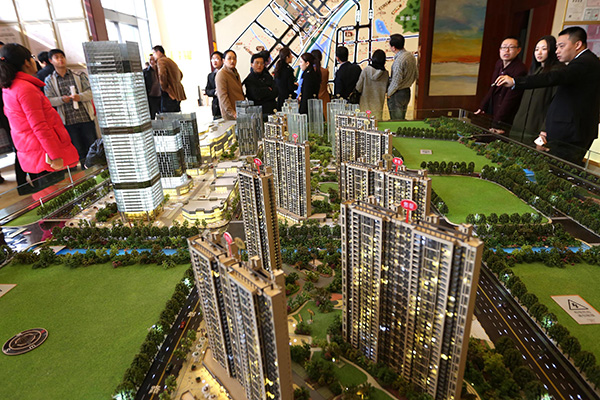More investment options would check home prices — China Daily commentary
 |
|
Homebuyers at the sales center of a property project in Nanjing, Jiangsu province, on Feb 29. Cities like Nanjing and Shanghai have announced preferential housing tax policies, which have ignited local enthusiasm for home-buying. [Photo provided to China Daily] |
China’s banks, financial regulators, government officials and homeowners can all perhaps breathe easier. Despite surface appearances, China’s over-heated property market will not collapse as the US housing sector did in 2008, taking much of the world economy down with it. Yes, there are danger signals in China’s enormous real estate industry. China’s problems are real and need addressing, but the differences with the United States are large and decisive.
Start with the fact the US housing crash was brought on by lax lending practices, a politically rigged regulatory system and a debt-fueled “buy-and-flip” short-term investment strategy. Another fundamental difference: in the US buying a house with borrowed money is subsidized by the tax code. Not so in China. China also, thankfully, has nothing like the subprime “Ninja Loans”ï¼meaning loans to those with no income, no job, no assetsï¼that were widely available in the US before the crash.
The biggest risk in China is not a US-style tidal wave of failed mortgages that leave families homeless and banks insolvent. Instead, the risk comes from an unbalanced flow of capital into property investment. Too much of China’s total savings are now going into this one form of investment. While buying apartments has long been popular, other types of investments-especially in the stock market and in unregulated fixed-income securitiesï¼have suffered a big decline in popularity in recent months, with good reason.
The weight of all that additional money flooding into property investment inevitably pushes housing prices up, especially for apartments in major cities. Putting more land on the market for development and building more low-cost housing are both good moves.
But the best way to cool China’s housing market both now and for years to come is to have more good and safe alternatives for people to invest in. This will take some time as well as a strengthened regulatory and legal environment. But changes are urgently needed.
Meantime, the government should continue its policy to gradually expand the amount of money Chinese can legally invest in shares and mutual funds outside China.
Chinese savers and investors, like those in other countries, look for the highest return at the lowest possible increment of risk. In the last nine months, this risk-return calculus has undergone some profound changes. That’s not only because of the steep slide in the stock market since July last year, which caused many Chinese investors to pull their money out.
Other hot areas have tumbled just as sharply, as slowing growth exposed the risks of these alternatives. Wealth management products are basically a form of collateralized lending direct from savers to larger Chinese companies and municipalities. Investors have grown more worried about defaults and other signs of mounting trouble among borrowers. The interest rates on offer don’t seem adequate to compensate for the risk.
Even more worrying is what’s happened of late in so-called peer-to-peer (P2P) lending. This was until recently the hottest new way for individuals to earn big money with their savings.
The amount of money invested in P2P lending last year nearly quadrupled from 2014 to 982 billion yuan ($149 billion). But P2P investors’ worst fears came true when one of the bigger P2P loan packagers, Ezubao, suddenly went bust in January. Ezubao had offered mostly fake investment products to nearly one million Chinese investors, with promises of annual returns of up to 15 percent. Ezubao allegedly took more than 50 billion yuan from investors. Sadly, the cardinal rule of investing, “if something sounds too good to be true, it probably is” is not as widely observed in China as it should be.
Little wonder then that investing in property should now seem to many Chinese like the safest and sanest investment, apart from putting money in a State-owned bank. While the investment logic is sound, the unfortunate result is that buying a place to live in is getting too expensive for too many people in China, especially in Beijing, Shanghai and Shenzhen.
More than most other places, China’s housing market is dominated more by investors looking for profits than people looking to put a roof over their head. The balance needs to be restored. For that to happen, these investors need to find other places to invest that offer the potential for equally attractive risk-adjusted returns.
The author is chairman and CEO of China First Capital.
http://www.chinadaily.com.cn/opinion/2016-03/17/content_23903326_2.htm
Â

